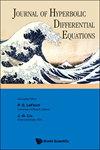The one-sided lipschitz condition in the follow-the-leader approximation of scalar conservation laws
IF 0.5
4区 数学
Q4 MATHEMATICS, APPLIED
引用次数: 2
Abstract
We consider the follow-the-leader particle approximation scheme for a [Formula: see text] scalar conservation law with non-negative compactly supported [Formula: see text] initial datum and with a [Formula: see text] concave flux, which is known to provide convergence towards the entropy solution [Formula: see text] to the corresponding Cauchy problem. We provide two novel contributions to this theory. First, we prove that the one-sided Lipschitz condition satisfied by the approximate density [Formula: see text] is a “discrete version of an entropy condition”; more precisely, under fairly general assumptions on [Formula: see text] (which imply concavity of [Formula: see text]) we prove that the continuum version [Formula: see text] of said condition allows to select a unique weak solution, despite [Formula: see text] is apparently weaker than the classical Oleinik–Hoff one-sided Lipschitz condition [Formula: see text]. Said result relies on an improved version of Hoff’s uniqueness. A byproduct of it is that the entropy condition is encoded in the particle scheme prior to the many-particle limit, which was never proven before. Second, we prove that in case [Formula: see text] the one-sided Lipschitz condition can be improved to a discrete version of the classical (and “sharp”) Oleinik–Hoff condition. In order to make the paper self-contained, we provide proofs (in some cases “alternative” ones) of all steps of the convergence of the particle scheme.标量守恒定律随导近似中的单侧lipschitz条件
我们考虑具有非负紧支持的[公式:见文]初始基准和凹通量的标量守恒律的跟随前导粒子近似方案,凹通量已知向相应的柯西问题的熵解[公式:见文]收敛。我们为这一理论提供了两个新的贡献。首先,我们证明了由近似密度满足的单侧Lipschitz条件是一个“熵条件的离散版本”;更准确地说,在[公式:见文]的相当一般的假设下(这意味着[公式:见文]的凹性),我们证明了上述条件的连续统版本[公式:见文]允许选择一个唯一的弱解,尽管[公式:见文]明显弱于经典的olinek - hoff单侧Lipschitz条件[公式:见文]。上述结果依赖于霍夫唯一性的改进版本。它的一个副产品是熵条件在粒子方案中被编码在多粒子极限之前,这在以前从未被证明过。其次,我们证明在这种情况下[公式:见文本],单侧Lipschitz条件可以改进为经典(和“尖锐”)Oleinik-Hoff条件的离散版本。为了使论文完备,我们提供了粒子格式收敛的所有步骤的证明(在某些情况下是“替代的”证明)。
本文章由计算机程序翻译,如有差异,请以英文原文为准。
求助全文
约1分钟内获得全文
求助全文
来源期刊

Journal of Hyperbolic Differential Equations
数学-物理:数学物理
CiteScore
1.10
自引率
0.00%
发文量
15
审稿时长
24 months
期刊介绍:
This journal publishes original research papers on nonlinear hyperbolic problems and related topics, of mathematical and/or physical interest. Specifically, it invites papers on the theory and numerical analysis of hyperbolic conservation laws and of hyperbolic partial differential equations arising in mathematical physics. The Journal welcomes contributions in:
Theory of nonlinear hyperbolic systems of conservation laws, addressing the issues of well-posedness and qualitative behavior of solutions, in one or several space dimensions.
Hyperbolic differential equations of mathematical physics, such as the Einstein equations of general relativity, Dirac equations, Maxwell equations, relativistic fluid models, etc.
Lorentzian geometry, particularly global geometric and causal theoretic aspects of spacetimes satisfying the Einstein equations.
Nonlinear hyperbolic systems arising in continuum physics such as: hyperbolic models of fluid dynamics, mixed models of transonic flows, etc.
General problems that are dominated (but not exclusively driven) by finite speed phenomena, such as dissipative and dispersive perturbations of hyperbolic systems, and models from statistical mechanics and other probabilistic models relevant to the derivation of fluid dynamical equations.
Convergence analysis of numerical methods for hyperbolic equations: finite difference schemes, finite volumes schemes, etc.
 求助内容:
求助内容: 应助结果提醒方式:
应助结果提醒方式:


